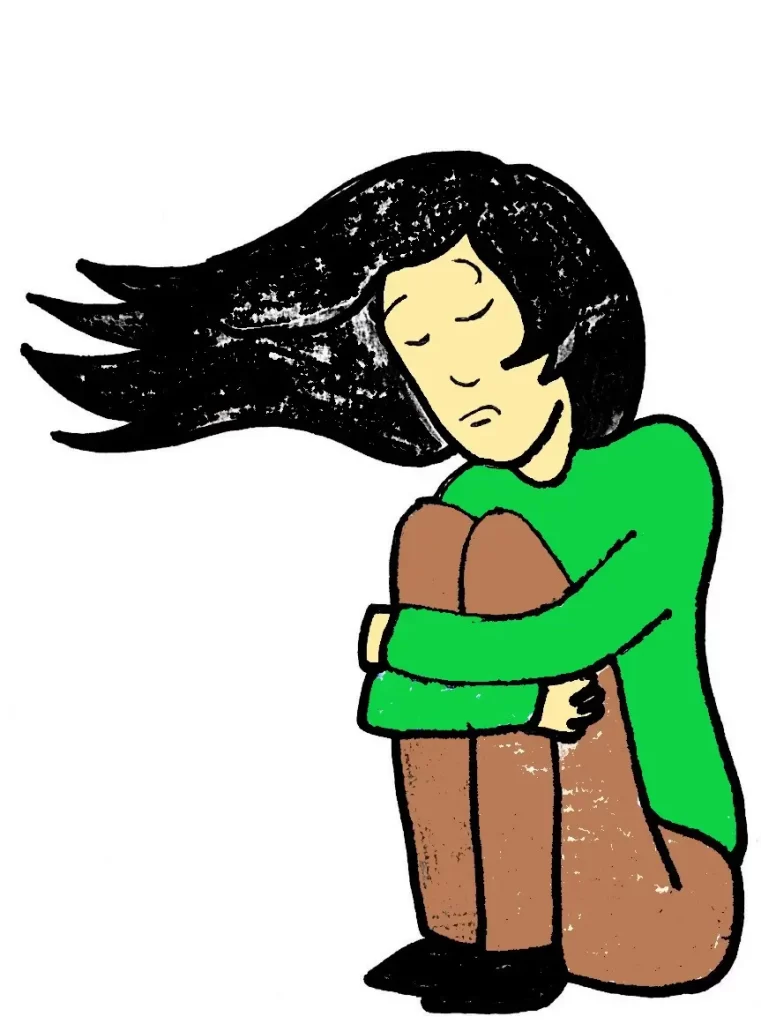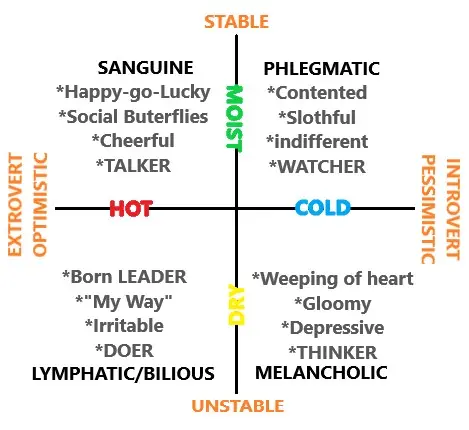
Hello friends, in this post we are going to learn about the meaning and Types of temperaments and its importance in Homoeopathy.
Table of Contents
ToggleWORD MEANING
The word Temperament is a Latin derivative of “TEMPERARE” which means “TO TEMPER” or “A PERSON’S STATE OF MIND”.
TEMPERAMENT= A PERSON’S PRESENT STATE OF MIND
HISTORICAL INSIGHTS
According to Aristotle, “Temperament is the particular nature of a Person, Body and Soul”.
Hippocrates (469 BC- 377 BC)
- He was a Greek philosopher and physician who is known as the father of Medicine.
- He believed that body is made up of four Humours.
- BLOOD, PHLEGM, YELLOW BILE and BLACK BILE.
- These Humours circulate in the body and determine the unique physical, mental and emotional qualities of a person.
- If any imbalance in these Humours occurs, they can cause disease condition.
- Eventually these Humours are known as Temperament namely,
Sanguine (Blood)
Phlegmatic (Phlegm)
Melancholic (Black bile)
Bilious (Yellow bile)
Claudius Galenus
- He was a Greek physician, surgeon and philosopher in Roman empire.
- He believed that these Humours are formed in the body (rather than ingested).
- According to him these humours can be influenced by the type of food we ingest.
- Galen used the term “Bodily disposition” because temperaments can determine a person’s susceptibility towards particular diseases and emotional or behavioural tendencies.
DEFINITION
Temperaments are the tendencies of an individual to act or behave in a particular manner.
These tendencies are determined by combination of biological, mental, emotional and intellectual qualities.
Temperaments are also determined by genes and environment.
GENERAL CHARACTERISTICS OF TEMPERAMENTS
- They are the unique expression of an individual.
- They are the expression of physiological and pathological qualities of living organisms.
- They are the state, disposition, type of physical constitution and internal organisation.
- Temperaments are represented in the form of reactions of an individual towards external and internal stimuli.
- These reactions are depending on the constitution of a person.
- They are the sum total of physical, biological, psychological, environmental and dynamic composition.
CLASSIFICATION
There are mainly four types of temperaments have been suggested to be observed in a person.
- SANGUINE
- CHOLERIC/ BILIOUS
- PHLEGMATIC
- MELANCHOLIC
We also can observe them in combination in a single person but one type will always dominate to others.
1. SANGUINE TEMPERAMENT

The word Sanguine is a Latin derivative of “SANGUS” which means “BLOOD”.
SANGUINE = FIRE + HEAT + MOIST
CHARACTERISTICS
- People having this temperament tend to be Joyful, Lively, Extrovert, Carefree and Talkative.
- They are warm hearted individuals who are Optimistic, Confident and Responsive.
- They can easily make new friends (Sociable), who are known as social butterflies.
- They can be artistic with full of ideas and imaginations (Day dreamers).
- They are Happy-go-lucky type of people (Enjoying the beauty of life).
- They are full of pulse and having good metabolism.
MORBID STATE
- They can have blood related diseases.
- Diseases like Febrile Inflammation, Diarrhoea, Tachycardia, Vascular abnormalities are commonly observed.
- Diseases are mostly associated with Lassitude (lack of energy).
- They are chronically Late and Forgetful people.
- They can be Impulsive, Jealous or Envious.
Examples- ACONITUM NAPELLUS, CACTUS GRANDIFLORUS, NUX VOMICA, PHOSPHORUS etc.
2. CHOLERIC (BILIOUS) TEMPERAMENT

The word Choleric is of Greek derivation of “KHOLERA” which means “BILIOUS”.
Bilious corresponds to the Yellow bile.
CHOLERIC = FIRE + HEAT+ DRYNESS
CHARACTERISTICS
- People having this temperament tend to be Egocentric and Extrovert.
- They can be easily Excited, Impulsive and Restless.
- They are full of Energy and Aggressiveness and try to implant them on others.
- They are Born leaders, Task Oriented people with full of Confidence, Decisiveness and Strong Willed.
- They are highly Ambitious and Focused on getting a job done efficiently.
- They like to be in charge, so that they can Show Leadership.
- They are very good at planning and often come up with practical and solution related ideas.
- They also like to receive respect and esteem for their work.
MORBID STATE
- They are easily prone to anger.
- They cannot bear contradiction.
- They may suffer from superiority complexion.
- They can be Deceitful and Hypocritic.
- Many times, they seem like having lack of sympathy and unemotional.
- Physically they are prone to Liver diseases.
- Diseases like Insomnia, Hyperacidity, Excessive physical sensitivity (especially of skin) are commonly observed in these individuals.
Examples- ALOE SOCOTRINA, ARGENTUM NITRICUM, BRYONIA, LACHESIS, PODOPHYLLUM, PLATINA.
3. PHLEGMATIC TEMPERAMENT

The word Phlegm is Latin derivative of “PHLEGMA” which means clammy moisture of the body.
PHLEGMATIC = WATER + MOISTURE + COLD
Phlegm is a thick viscous substance secreted by the mucous membranes of respiratory tract.
CHARACTERISTICS
- People with phlegmatic temperament are Calm, Sluggish, Indifferent and Very Lazy.
- They are Introverted, less sociable (reserved), Caring and Sympathetic.
- They usually have a rich inner life, prefer a quiet and peaceful surrounding.
- They seem to be contented with themselves and live their life with harmony.
- They are Dependable and trust worthy friends.
- Even we can observe the slowness and hesitation in their speech.
MORBID STATE
- They are literally couch potatoes (Little or no physical activity and watching lot of television), Lazy and Slothful (slow moving).
- They are so fatigued that they neglect their duties.
- They are Indecisive with habit of procrastination (tendency to delay or postpone).
- They seem to have no ambition and desire to achieve something.
- They may have pallor of skin.
- Respiration- Slow and shallow.
- Complains like Lymph node enlargement, Glandular swelling, Venous stasis etc are commonly observed.
Examples- CAPSICUM, PULSATILLA.
4. MELANCHOLIC TEMPERAMENT

The word Melancholic is made of two Greek words “MELEN” which means “BLACK” while “CHOLE” means “BILE”.
MELANCHOLIC = MELEN (BLACK) + CHOLE (BILE)
This Temperament is the combination of Air, Coldness and Dryness.
MELANCHOLIC = AIR + COLD + DRY
CHARACTERISTICS
- People with this temperament are Introverted, Serious and Cautious.
- They are Pessimistic (Negative thinker) and Suspicious (Doubtful) people.
- They are usually Quiet, Unsociable and Reserved.
- They are prone to be preoccupied with the tragedy and cruelty in the world.
- They are susceptible to Moodiness, Depression and Vulnerability.
- On the other hand, they are Very talented, Highly Creative, Sensitive and Day dreamers.
- They prefer to do things by themselves may be because they want to maintain their own standards and they are not very sociable.
- These people are self-sacrificing, Thoughtful, Responsible and Trustworthy.
MORBID STATE
- They are Depressive and Brooding (Deep thinking of something which can make one unhappy) type of people.
- They have lack of Self-confidence and are Oversensitive towards the surrounding environment.
- Complain of Heart, Endocrinal disturbances, GIT disturbances are commonly found in these types of personalities.
Examples- AURUM METALLICUM, BARYTA CARBONICA etc.
You can easily compare and remember these four types of temperament by studying this Image.

ADDITIONAL TYPES OF TEMPERAMENTS
Some historical writings also introduced a few additional type of temperaments.
They are:
- NERVOUS TEMPERAMENT
- LYMPHATIC TEMPERAMENT
- IRRITABLE TEMPERAMENT
NERVOUS TEMPERAMENT
- The people with nervous temperament have easily excitable nerves.
- They are mentally and physically alert.
- They take their decisions very quickly.
- They show great Excitability, Apprehension along with Moodiness.
- They are Studious, Inventive and Very accurate towards their work.
- They are Passionate, Ambitious and Hard workers.
- They are Loquacious, expressive and Intellectual beings.
Morbid state
- Physically they may be Lean, Pale and have Weak musculature.
- Skin- Thin, Fair, Delicate.
- Pulse- Thready and Frequent.
- Complains of GIT and Heart are commonly found.
Examples- ACTEA RACEMOSA, AGARICUS, NUX VOMICA etc.
LYMPHATIC TEMPERAMENT
- This temperament is a result of profuse flow of lymph in the Lymphatic vessels.
- The Glandular secretions are seeming to be distributed in this type of temperament.
- Patient is characterised by Sluggishness with defective circulation of Blood.
- They have tendency to catch cold very easily, Catarrh of Respiratory tract, Urinary tract infections, Allergies etc.
- They show slowness of Digestion, prone to develop stomach ulcers, Constipation, Piles or Fistula.
- Physically they are deposed to get Obese, Anaemic (pale with poor appetite, wasting of muscles with less growth of hair.
- Complains related to Lymphatic system and Glandular swellings are very common.
Example- BAPTISIA TINCTORIA, HEPAR SULPHURICUM etc.
IRRITABLE TEMPERAMENT
- The patient with Irritable temperament has tendency to get angry very easily.
- They are very annoying type of people.
- They are hard to please.
- They are very restless and always stays on the edge.
- Complains like Insomnia, Skin diseases, Renal Troubles, Asthma, Cancerous affection are commonly observed in these individuals.
- They can be ill-humoured and Cross.
Example- APIS MELLIFICA.
IMPORTANCE OF TEMPERAMENTS IN HOMOEOPATHY
- Helps to individualize a person
Temperament decides the tendencies of an Individual.
↓
These tendencies are latent at birth.
↓
A person grows and develops with different internal and external stimuli.
↓
This development of him will define his becomingness and he reacts accordingly.
↓
These reactions are peculiar to each individual and inherited by a person himself.
↓
Thus, each individual is different from one another.
- we can modify them in order to treat the diseases.
Temperament are not constant and unchangeable.
↓
They can be modified by internal or external influences.
↓
Because, temperaments are broadly influenced by the environment.
↓
Each individual is capable of modifying it (remember, these modifications are always limited).
↓
Example– A person suffering from obstinate constipation due to sedentary life style can treat his complains with the changes in his living habits (by exercising and active lifestyle) and by proper dietary management.
- Temperaments helps a physician to study the cause and pathogenesis of disease.
- A physician with the knowledge of a person’s temperament can prevent the undesirable complications.
- Study of temperament helps in selection of most similar remedy.
- Temperament helps in grouping of remedies of homoeopathic Materia medica with similar temperaments.
POTENCY SELECTION
HIGHER POTENCIES
- Sensitive persons of Nervous, Sanguine or Choleric temperament.
- To Intelligent people.
- To person with intellectual qualities.
- To people who are Quick in Action and Reaction.
- To Ambitious, Zealous and Optimistic personalities.
- To Impulsive people.
LOWER POTENCIES
- To Sluggish and Lazy individuals.
- To people with Lack of Enthusiasm.
- To Phlegmatic individuals.
- To people who are Low in Action and Reaction.
- To Contented, Depressive and Pessimistic personalities.
- To Quiet and Introverted people.
Hope you find this post helpful to clear your concepts on temperaments. Do not forget to Share it with your friends and colleagues.
Meaning of difficult words
- Aggregate: The total sum or combination of different elements.
- Physiological: Relating to the normal functions of living organisms and their parts.
- Pathological: Relating to the study of diseases or any deviation from a healthy, normal condition.
- Disposition: A person’s inherent qualities of mind and character; temperament.
- Dominant: Having the most power or influence; prevailing.
- Sanguine: Cheerfully optimistic, hopeful, or confident.
- Phlegmatic: Having an unemotional and stolidly calm disposition.
- Melancholic: Characterized by or causing or expressing sadness.
- Egocentric: Thinking only of oneself, without regard for the feelings or desires of others; self-centered.
- Extrovert: An outgoing, socially confident person who enjoys being with people and participating in social activities.
- Introverted: Shy, reticent, or reserved; more interested in one’s own thoughts and feelings than in interacting with others.
- Apprehension: Anxiety or fear that something bad or unpleasant may happen; dread.
- Loquacious: Talkative or chatty, especially to an excessive degree.
- Ambitious: Having or showing a strong desire and determination to succeed.
- Decisiveness: The ability to make decisions quickly and effectively.
- Practical: Concerned with the actual doing or use of something rather than with theory and ideas.
- Solution: A means of solving a problem or dealing with a difficult situation.
- Pallor: An unhealthy pale appearance.
- Procrastination: The action of delaying or postponing something.

explanation is too good and clear everything
Thank you Vaishnavi…
Ma’am.
Thank u so much for this precious Knowledge of homoepathy.
Nicelly explained
Wonderful explanation with easy to understand…
Thanks for sharing it..
Wow…vary good explanation, very easy for understand
Thank you…
Glad to know this Prerna…
Great
Very knowledgeable article about homeopathic insights. Plz, let me know about your other endeavours in Homeopathic medicine and therapeutics.
Happy to hear from you…there is another website that is dedicated to homoeopathic therapeutics…homeosage.com…you can also follow us on Instagram.
Very interesting explanation .
Very good explanation. Thanks a lot.
Thankss
Such a great explanation
Very easy way to exaplain a complicted and impartent topic. Thans.
Glad to hear that…
Very good explanation. Informative post. Thank you
Very nice and knowledgeable. Help homeopath beyond materia Medica !
My regards
Very good explanation & thanks for the sharing the same. If one finds a right medicine base on one’s Temperament, then will it help in curing the illness in totality or what are the other important factors which needs to be considered besides Temperament. Please guide. Thanks.
Rajiv Sardana